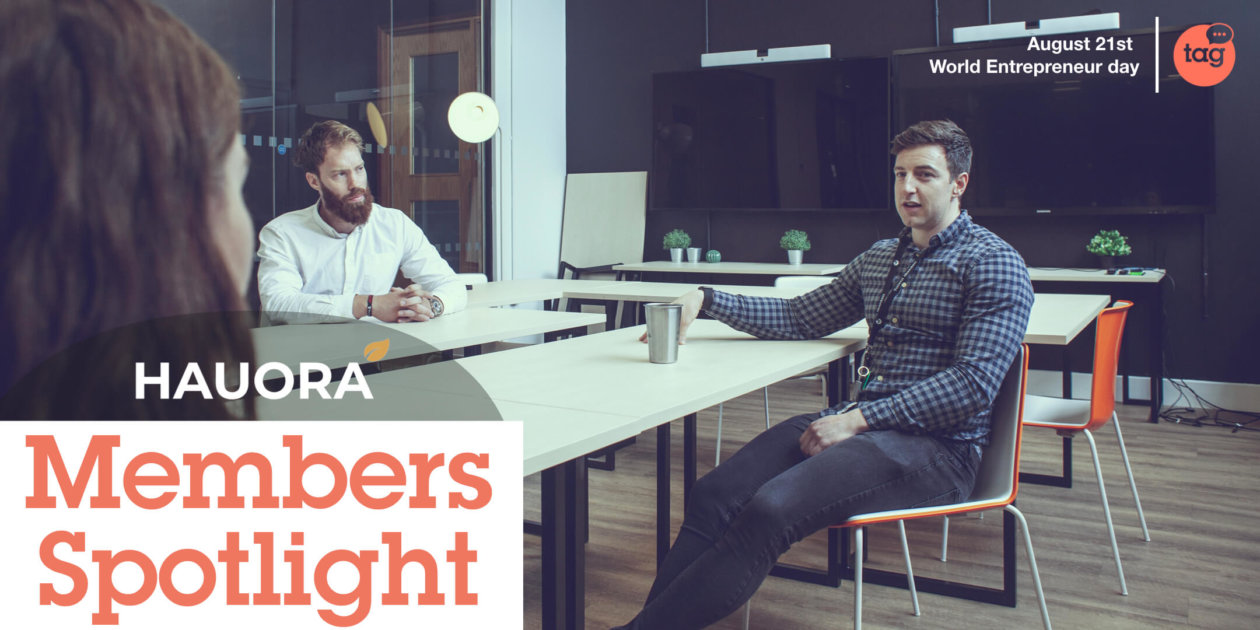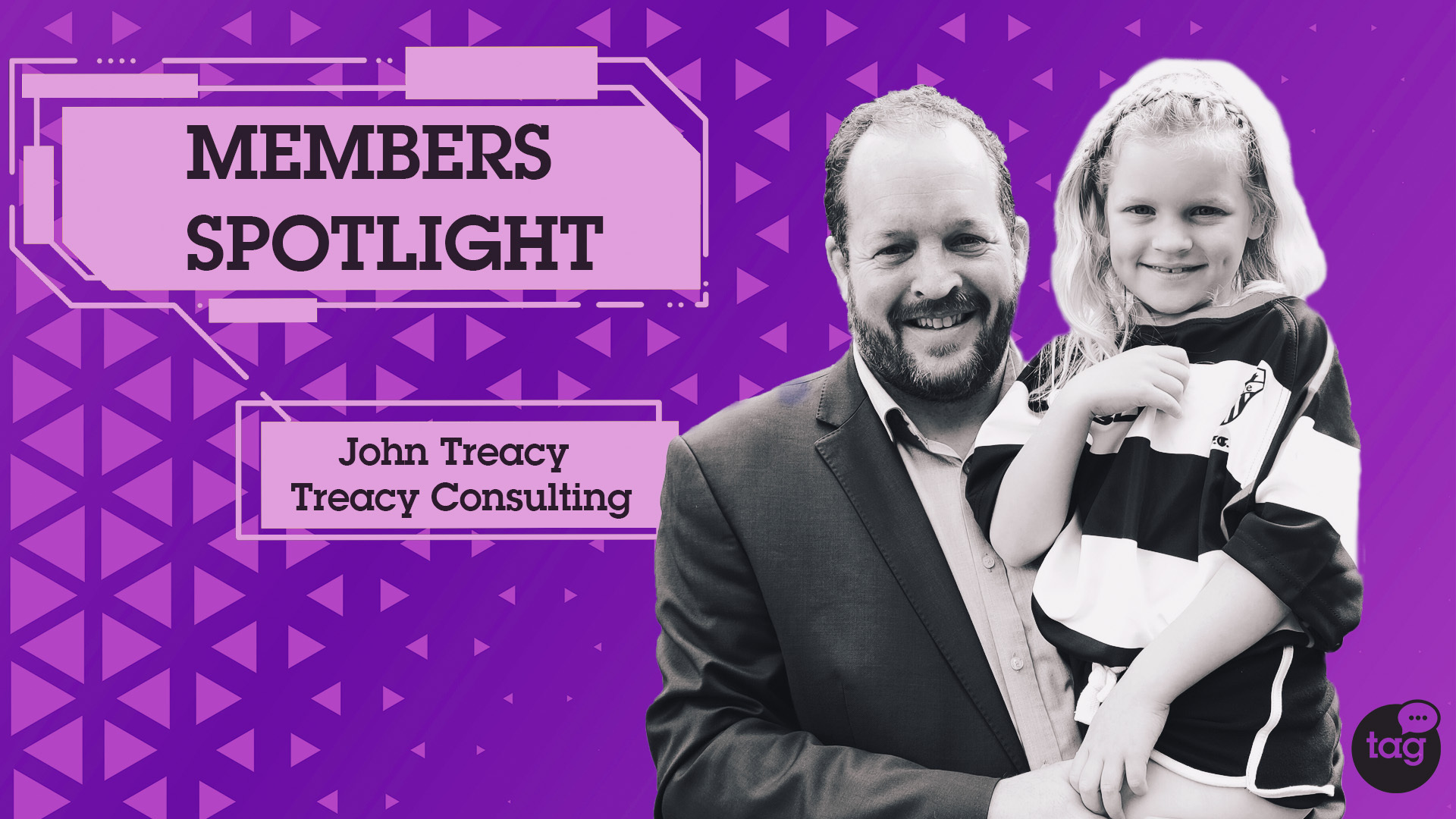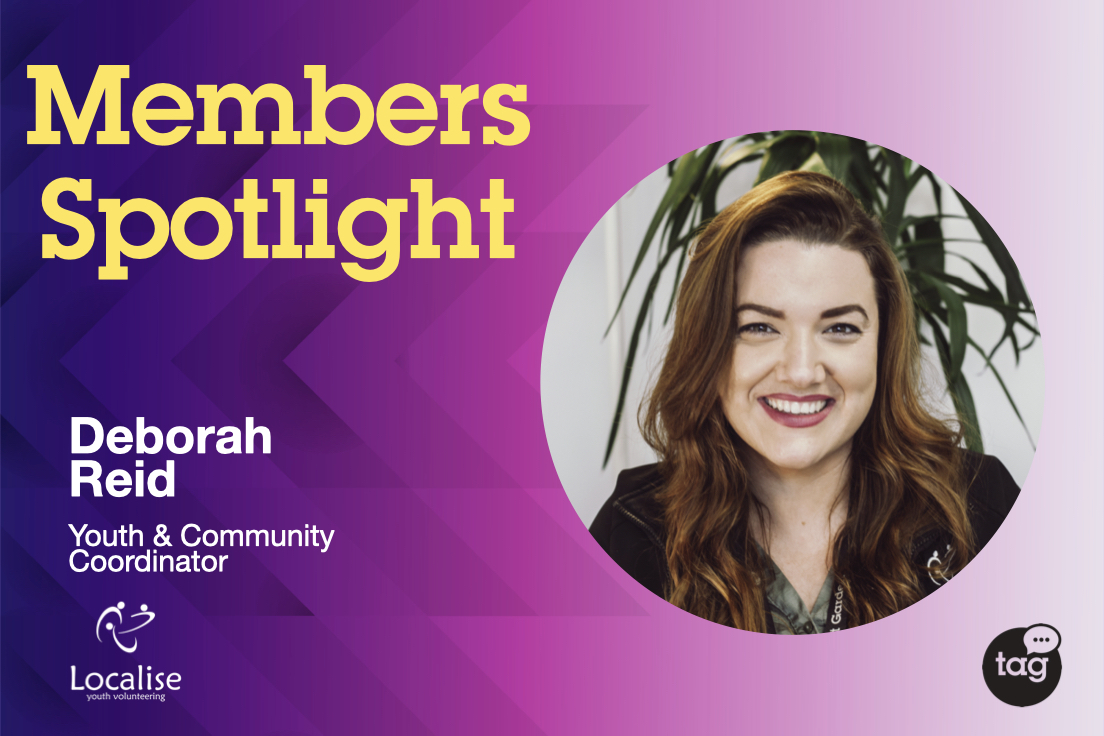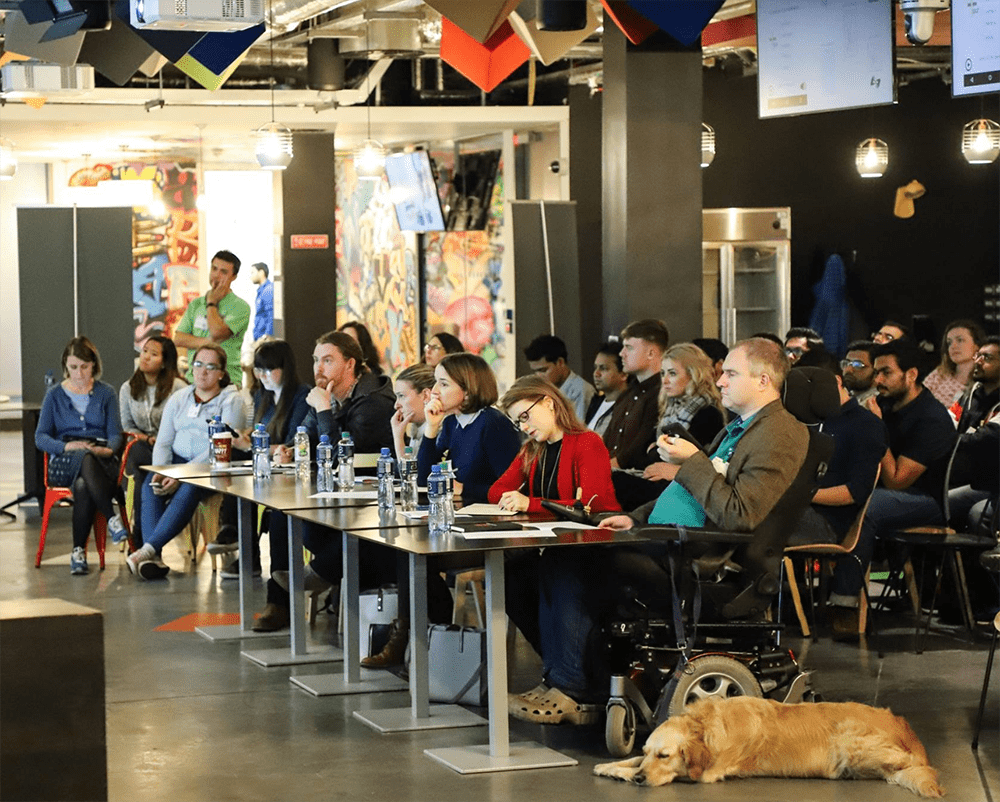- Home
- Business Innovation
- Transforming Corporate and Sporting Sectors Through Wellbeing
Business Innovation
12
min read
Transforming Corporate and Sporting Sectors Through Wellbeing


Don't you want to read? Try listening to the article in audio mode 🎧
At Talent Garden Dublin we are launching a new initiative called Members Spotlight! Because of Covid 19 our members can no longer network the way they used to, we also recognise the 'zoom fatigue' and how overwhelming all the different online events can be. For us, our community is special and we are lucky to hear the amazing stories of our members every day, and we want to share them with our wider community! Our first members spotlight is focusing on our members at Hauora, a startup offering bespoke on-site wellbeing intensives and consultancy in corporate and sporting environments.
Hauora was formed to impart knowledge, passion and expertise from the worlds of physiotherapy, psychology and sports medicine into the corporate and sports worlds. The aim is to create healthier environments by means of interactive, practical and innovative workplace interventions and consultancy.
David Clancy, Ciaran Dunne, and Rachel Sheehan bring extensive experience and professionalism from diverse backgrounds to work collaboratively with clients to customise a bespoke programme to align with a company’s core values. Hauora represents growth and wellbeing for companies looking to initiate positive behavioural change to enhance satisfaction, wellbeing and performance for everyone.
To celebrate World Entrepreneurs Day, we sat down with David and Ciaran, the Founders and Directors of Hauora.



How did Hauora come to life? Was your initial idea similar to the business that you’re running now?
DC: About 18 months ago, we were working at our sports medicine and physiotherapy clinic in Dublin City centre. We noticed that when we saw clients and patients they were only being looked after for physical injuries even though they were burnt out and talking to us about things that weren’t injury related. It included people from really big corporate companies. Naturally, we began to have more open and candid conversations and noticed that there were many clients that were missing a wellbeing space or a piece to them that is not just a physical injury that's manifesting itself. In October 2019, we were offered an opportunity to run a series of workshops at a large manufacturing company in Limerick. We agreed and thought it would be good to try something that’d be a bit of a challenge for us. We didn’t have our company formed at the time, but we generated a philosophy, a value system, imagery, statements, and what we wanted to encapsulate. The original proposition was a one-hour workshop which then became an opportunity to do 4 day long consecutive workshops. It suddenly became a huge venture and we shared a platform and facilitated learning together. We would work with people coming in steel caps and helmets and put them into a space doing exercises together and talking amongst themselves. We were diligent on feedback, making sure we had everyone from senior leadership right down to cherry pickers and electricians telling us their thoughts. Over 4 days we had 350 people attend our workshops. The transition from our initial idea to our business model came naturally to us. CD: When we decided to carry on with these workshops, we were seeking clients in financial and legal sectors in Dublin as they were the kind of client’s we had conversations with at our physio clinic. Physiotherapy is an evidence-based profession and we use a scientific background for interventions being proven, whereas the wellbeing industry wasn’t necessarily focused on the same approach, specifically in terms of the interventions being offered. There’s a gap in using the basis of physiotherapy and sports medicine to help interventions and have an impact on people’s behaviour in their working environment. This often leads to workshops carried out in a different space or a retreat. If you can build these habits in your daily life it will affect your work and home life and behaviours in your environment... and hopefully make you happier!What inspired your company’s name and why is it valuable to you?
DC: After we had our big success, we were offered to run a wellbeing workshop in BDO for their group. The next hurdle was to think of what we should call ourselves. It was just the two of us at the time and we were working in a mental wellbeing space and with motivation, anxiety, and stress being so topical we knew we were missing a psychologist. We hired a sports and performance psychologist, Dr. Rachel Sheehan. Rachel is a KeepWell Mark assessor for IBEC. She travels to companies to audit the wellbeing programmes in order to gain the IBEC KeepWell Mark. She is a huge addition to Hauora. She has an extensive skill set which sets a different tone and she can talk in an area of expertise where we cannot. So, the three of us kept coming back to the same question: what will we call ourselves? It was Rachel who said “You lived and loved New Zealand.” I said “Yes I do, it's a great place”. Hauora is a philosophy in New Zealand in Maori culture that with the meaning that in order to build a house well for a person you have to be physically, mentally, socially, and occupationally well. If any of those walls fall down the house can crumble. The philosophy is more known in the holistic care and yoga circles so we thought it'd be nice to encapsulate that into the corporate-wellbeing sector. The fact that it's hard to pronounce always makes it interesting because it leads to people asking us to tell them the history behind the name, which helps develop the brand further and has become a selling point and differentiated us.Do you find that there's a strong correlation between working in physio and Hauora?
CD: We take a holistic approach to care and going back to our healthcare backgrounds we know that is the way we should be treating people. As physiotherapists we have to look at the whole person when looking after patients, so we kept that perspective as whole personal wellbeing. Many of the sports teams that we’ve worked with took care of their players as if they are the keystones of success. They’re looked after from all angles and give them all the support and opportunities that let them blossom. We think of our clients as a corporate athlete instead of people working for a paycheck, and instead find their values, mission, and their individuality to align with similar values that the company holds to build a stronger relationship. DC: The comparison between elite, high performance sport and business is interesting. If you're an athlete in a top league you look after your nutrition, sleep well and recover with a team of medical, healthcare and professional support care around you nevermind the coaching side of things. How can we bring that into a working space so that workers can become the thought leader themselves and take ownership and build that awareness piece? The best stories we've had from feedback are not from HR directors, but someone further down the chain of the company that say “I didn't realise that was so important and I should be doing more of this and that's why I react this way and that's what you mean about flow when you’re talking about productivity.” It's nice to see it manifest in that kind of environment.Did you find it more difficult for corporate groups to open up at these interventions?
DC: We did find it more difficult at first, depending on who you are having a conversation with. More often than not when we're trying to set up a workshop or retreat it's the decision makers we’re speaking to but the openness from higher up people isn't quite there. If you're coming into our clinic there's already a bit of vulnerability whether there's an injury or an identity piece is missing, but that's not the case going into corporates. It's a challenge and we're getting better at it and learning all the time. CD: It's definitely a different dynamic but it is because the role you play as a physio when you are assessing someone that you're the person they come to but when you’re trying to find business or client acquisition it's building that trust initially. We’re coming in with the mindset that we’re here to help your employees regardless of the financial aspect so we maintain that as a value that we’re here to improve people's health which resonates better with the decision makers. DC: I think the language you articulate is important when you're having a conversation with a managing director. If we say we’re facilitators, we’re change agents, we’re here to strike up a partnership, to compliment, to build on what you already have. We help refine and improve in certain areas where we both see the need. We often say we’re here to build a bespoke service and that we’re acknowledging they are doing well and collaboratively we can optimise their wellbeing programme.What's been your proudest moment that you didn't expect from this venture?
CD : With our events we have such diverse populations. As we said there's people in manufacturing industries that come from work at 5/6am and still get value from us and giving feedback that's just as positive from people in Dublin in an office that already has these gym memberships and additional facilities. It is really good to see that we can work across these diverse populations because over the years through working 1:1 you learn to understand how to communicate and relate when speaking to a client. We don’t just tell people to start doing yoga because it might not fit for them. It's about finding that balance and finding what fits for each individual and to know that we’re able to do that based on feedback is great. Corporate employees will usually mention that they’ve been offered gym memberships or discounts on lunch and that's great but there's also a few interventions they can do at their desk or daily habits that can make a difference. It's important to provide the tools, not just the facilities. If you offer a gym membership to 100 people whos to say that all are healthy with no pain, anxiety, and are happy to do it. The pride comes from the fact that we can have an effect individually because that is why we became physiotherapists and we can carry this on in our business venture. DC: Also, we paid a company to refine our brand and help us with the language and imagery for the marketing and PR websites. This was before and during COVID-19. It was a big investment at the time. They were so influential in terms of what we’re trying to do with our mission and vision. We’ve kept a strong relationship and channel of communication with this company since then. I came out of that proud that we obviously made an impact as they talk to a lot of people that are influential, but it echoed through to them and we’ve maintained a connection that could lead to future collaboration.
You were saying that you work to affect people and their behaviours using a holistic approach. Is it a challenge to make sure there's something there for everyone?
CD: You could go in, give a talk, tell everyone what they should be doing and maybe one or two people take something away from that. So we try to be alternative in what we do and create interactive engagement instead of long lectures. We want to make an impact. We try to break it down so that employees can interact with their team members and do exercises where they've to find the answers themselves. We try to work introspectively all the time, we might give them a workbook which probes questions for them to understand. We may not get to every individual but they take the time to be stimulated and look inside to think what roadblocks there are and what they're good at. If people after the events want more we can facilitate them on an individual basis no problem. Even though everything has to remain virtual for the moment, we wouldn't dream of doing a simple slide heavy presentation. Giving people the sense of intervention over Zoom is quite difficult so what we do is to try a break out room or do something different and more engaging. It's difficult when people are at home and have distractions so we ask for half an hour of your time and we’ll give you the tools- we want you engaged and have a more conversational and interactive session.Could you give us an example of a workshop activity you have done?
DC: We did a ‘murmuration exercise’ with a group of 30 people on site with 3 big questions that we wanted participants to ask themselves and their small group of 3-4 people. They wrote their answers on flashcards and put them on a whiteboard so they became pooled together onto a pillar. There was such a variety of answers along with the sense of freedom in that anyone could say what they wanted. So by murmuration exercise we’re referring to the concept of seeing a flock of birds individually come together to show strength and cohesion. This was very well received because we heard everyone's voices being brought together. For leaders, it was good for performance, productivity, understanding absenteeism and all those benefits that they strive for.What has been the biggest learning curve for you?
DC: When you're a small business you have to be good at a lot of things. We’re good at speaking to clients but if we can't sell our product that opportunity doesn't happen.We have had to learn the language, dialogue, how to word emails, our close, price point and positioning. The biggest learning curve, and what I’ve invested most time into, has been marketing and selling and following up with clients. Our target clients could work with anyone internationally. A year ago I thought that selling would be a conversation but it's more - it's 3 conversations with 3 different people, a Zoom call, and follow up emails. We could be waiting 5 weeks for a yes. The big surprise is that it is more difficult to land business than people think. CD: We’ve to do it all. We do our own editing, our podcast with high performers, selling, marketing, improving and refining our brand. We wear different hats everyday and we speak to different people daily so we have to catch onto the industry language quickly. The surprising thing for us is that a lot of people are willing to help you if you ask. We’ve reached out and received help from people close to us. People are always trying to see you do well and we’ve great support nationally and internationally. DC: A huge influence has been my Dad in terms of ideas and direction. He operated for many years, at senior management level and so has a great insight into what works, where to invest time and energy, and outsourcing. When you have someone that can say park it, that's not a priority to work on, that's what gives us the time to work on something more important.How has Hauora affected your day-to-day life? Can you take those tips you give for yourself?
DC: Usually yes, but sometimes it goes out the window! I see myself preaching about it but do I actually do it? I do meditation, yoga, and gratitude but as we’re starting a business I am more aware of stress than I would've been 3 years ago. So I can say in my head “Could I have handled that better? Should I have handled that better?” It gets better and it’ll come at a point in time when I’ll get a hang of it. Although, I do find that we’re more efficient. I have my 3 priorities and I can tick them off so that when I go home I’m not on my phone or email. I’m much better at compartmentalising. You need to be as a startup and entrepreneur otherwise it’ll bleed into everything you do. People assume because you're starting a business you need to work 24/7 but I think if you do 5-6 hours of good, deep, intentional work it's okay to relax and train, eat well, spend time with your family. I do that everyday and am very mindful and aware of that. CD: Gratitude definitely does work. Sometimes we’ll go on walks to the Botanic Gardens beside Talent Garden or just walks around campus. We need fresh air and just change the dynamic which is important to do everyday. I can see my behaviour change when I'm inside all day so I take 5 minutes out of the office and turn off the laptop. I’ve incorporated these habits from David and I won't sit at a desk longer than an hour. To sit back and unplug for a few minutes you can feel better. You can think of all these highly conventional things like yoga which is great, but if you're not ready to go to that level just taking a break could be best for you. People have it in their heads that they should always be available 24/7 so if you make the time to sit back you can find yourself doing 15 minutes of better work than you've done in the past 2 and a half hours.What was the first thing you noticed joining Talent Garden Dublin?
CD: We had already visited multiple coworking spaces before meeting Machaela for our tour. I remember before our tour with the community manager someone at the cafe waved to her and said “Hey Machaela!” and we thought it was almost staged. When we walked into the office space another person waved hello and they started to chat. It was so different to other coworking spaces because she wasn’t solely trying to sell Talent Garden formally to us but instead we saw people that work here wanting to engage and clearly had a good relationship with everyone. As we passed through different sectors, the cafe, and different companies we still continued to get the same positive vibe. DC: It was recommended to me from a friend at Common Purpose, Kristina Moody, who told us to check it out. She told us that there's a lovely green space out the back of the campus and a nice Italian café restaurant, and that the staff and members are really warm and friendly. When we walked in it was exactly what we expected. There's a lot to be said about being warm and smiley and friendly, you don't see that enough. We’ve gone to coworking spaces that might look pretty or aesthetically great but if they’re miserable or seem false that will influence what you think of the place and we’ve never had that impression from Talent Garden. DC: That's something we haven’t done before! Usually, we’ll chat with our neighbours and have conversations at times that might have scope. We were talking about a logo with another member earlier and I found that whether it happens or not there's someone that can help us and they’re across the hall. It's something we need to do more so I think this initiative could be major for all members here.Even for something more casual we do in Dublin is a ‘Random Coffee’ with another member at our cafe.
DC: We’ve noticed with people after lockdown that they are not as outgoing anymore. I’d be interested to do it, it'll be interesting to see if people will. We love to be kept in the loop with events we love to hear of these initiatives to pivot around. Thank you to Hauora for taking part in our first edition of Members Spotlight! We're excited to hear more of our community members stories! Book a consultation: https://www.hauoralife.com/contact LinkedIn: https://www.linkedin.com/company/hauoralife/
Article updated on: 09 August 2023

Don't Waste Your Talent. Turn It Into a Career With a Course That Fits Your Needs!
Talent Garden is your Digital Skills Academy, offering courses in Digital Marketing, UX Design, Digital HR and Data Analysis designed to launch your career.
Keep reading

8
min read
The Key to Finding Success Through Work-Life Balance
At Talent Garden Dublin we have recently launched a new initiative called Members Spotlight! Because of Covid 19 our ...
Talent Garden
19/10/2020

7
min read
Integrating Digital Transformation with Community Care
At Talent Garden Dublin we have launched a new initiative called Members Spotlight! Because of Covid 19 our members can ...
Talent Garden
30/11/2020

2
min read
The Talent Garden Innovation School's Referral Program: what it is and how to apply
The Referral Program is an initiative designed to expand our community of digital innovators, bringing benefits to both ...
Talent Garden
22/06/2021

3
min read
Hack Access - Striving to Solve Accessibility Challenges Around the World
We love to celebrate our Talent Garden members and showcase the work they are doing as entrepreneurs, innovators and ...
Talent Garden
22/08/2019
